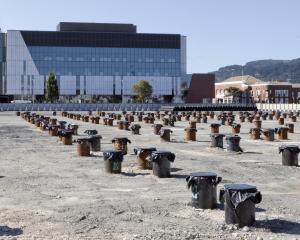
A key minister, Michael Wood, let him down badly. Mr Wood had no choice but to resign from Cabinet.
Mr Wood’s lackadaisical approach to his shareholdings and his inability to act on them is hard to fathom.
It was not just the now infamous 12 times the former transport minister was reminded by the Cabinet Office to sell his Auckland Airport shares, it was also the indications the shares had been disposed of when they had not.
The Prime Minister received assurances from Mr Wood there was nothing more to see.
Lo and behold, his family’s trust, where he is a trustee, holds shareholdings in companies affected by his ministerial portfolios. There are Chorus and Spark shares and the immigration decisions on telecommunications technicians, as well as National Bank of Australia (BNZ owner) shares and the banking inquiry.
Mr Wood put out a statement and then laid low. He claimed he discovered the shares as he prepared for the formal probe into his conflicts of interest.
"In some respects, my de-prioritisation of my personal financial affairs has led to this situation," his statement said, attempting to minimise his failures.
Mr Wood says the shareholdings made no difference to his actions and recommendations.
Everyone who knows him personally seems to believe that is probably true. He was respected for apparently being a "safe pair of hands", a capable "Mr Fixit", a popular and diligent politician who appealed to mainstream New Zealand.
But this all looks seriously bad. Mr Wood not only failed to declare conflicts of interests over several years but then kept digging his self-inflicted hole.
Not only is there the odour of inappropriate behaviour, but there is also an air of incompetence — and that from one of the supposedly best Cabinet ministers.
It comes on top of the Stewart Nash donations and mates’ scandal. Again, a valued minister who was able to communicate into the concerns of New Zealanders ignored basic principles about conflicts of interest. Again, the original sins were aggravated by partial revelations and inaccuracies to the Prime Minister that there was no more to see down the track.
Slackness and ignorance, it seems, pervade the political culture. Another of, purportedly, Labour’s best ministers, Jan Tinetti, was caught misleading Parliament. She then neglected to fix this mistake.
Her excuses about not understanding the rules spoke again to either incompetence or a lack of concern about fundamental parliamentary procedures.
Race Relations Commissioner Meng Foon has been caught up in an embarrassing and blatant conflict of interest saga this past week, and National’s Barbara Kuriger last year improperly tangled family interests with her role as agriculture, biosecurity and food safety spokeswoman. Minister Kiritapu Allan was caught in a family and ministerial integrity issue in April.
It is as if they all think "She’ll be right". They might be vaguely aware of conflicts of interests and the rules, but they do not really matter.
Mr Hipkins has proposed various actions to bring ministerial conflicts of interest "to front of mind". That, of course, is where they always should have been.
We have, however, reached an appalling state where he feels senior politicians must be constantly reminded about the matter and where officials, in essence, are to hold the hands of ministers to make sure they do what they say they will.
Little New Zealand so far seems to have avoided the blatant corruption common elsewhere. There are, however, dangers in the corroding conflicts of interests and in the potential for malfeasance.
This is all the more reason why this country should clean up its act on this issue as well as overhaul political donations and lobbying.
It remains a political self-interested disgrace that Parliamentary Services remains exempt from the Official Information Act, legislation that also sorely needs strengthening.
The cavalier way politicians have treated conflicts of interest highlights the need for fortified safeguards across several fronts.
"She’ll be right" is far from good enough.













